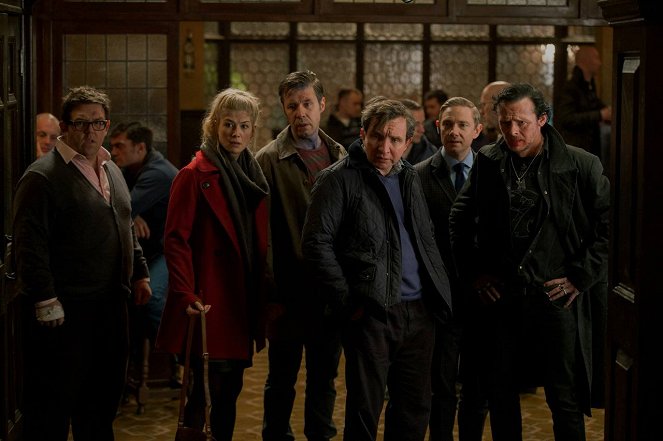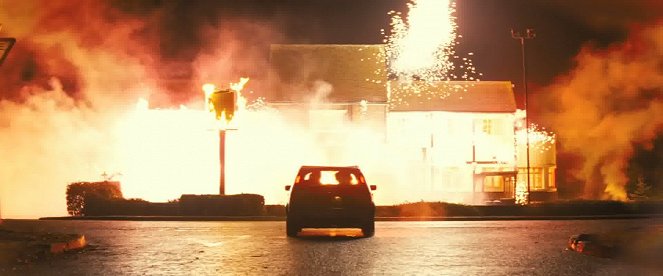Regie:
Edgar WrightKamera:
Bill PopeMusik:
Steven PriceBesetzung:
Simon Pegg, Nick Frost, Martin Freeman, Rosamund Pike, Eddie Marsan, Paddy Considine, Pierce Brosnan, David Bradley, Bill Nighy, Mark Heap, Rafe Spall (mehr)Streaming (4)
Inhalte(1)
In seiner Jugend war Gary King der absolute Siegertyp. Die Mädchen lagen ihm zu Füßen und alle Jungs wollten mit ihm befreundet sein. 20 Jahre später ist der "Glanz der alten Zeit" ziemlich verblasst und Gary sucht immer noch nach dem Sinn seines Lebens. Er beschließt, gemeinsam mit seinen vier besten Freunden von damals, in seine Heimatstadt Newton Haven zurückzukehren, um dort an alte Zeiten anzuknüpfen. Gemeinsam will die Truppe eine abgesprochene Sauftour zu Ende bringen, bei der in einer Nacht in 12 Pubs jeweils ein Bier getrunken werden muss. Die Tatsache, dass bis auf Gary mittlerweile alle ihre Unbeschwertheit gegen ein biederes Familienleben getauscht haben, macht die feucht-fröhliche Männertour nicht gerade unkompliziert. Hinzukommt, dass sich neben dem Lebensstil auch das alte Heimatstädtchen ziemlich verändert hat. Wer oder was jetzt hier das Sagen hat ist ein großes Rätsel und irgendwie nicht von dieser Welt... (RTL)
(mehr)Videos (22)
Kritiken (11)
Ich schwanke zwischen drei und vier Sternen. Das ist letztendlich eine der größten Überraschungen, die für mich The World's End vorbereitet hat. Und die anderen Überraschungen: Simon Pegg ähnelt Tomáš Hájíček aus der Band Krucipüsk, Nick Frost spielt – zumindest am Anfang – eine ganz, ganz, ganz andere Figur, als man erwarten würde, und Edgar Wright hat anscheinend auf seine typischen schellen Aufnahmen verzichtet oder zumindest versucht, sie einzuschränken, weil es davon deutlich weniger gibt. Ich kann nicht sagen, dass ich völlig enttäuscht gewesen bin, aber Fakt ist, dass mir The World's End viel weniger als die beiden vorigen Filme gefallen hat. Ich finde ihn zu lang und überflüssig actionreich (der erste Kampf mit den Außerirdischen war ausgezeichnet, aber die anderen haben ihn nur wiederholt – und nicht im lustigen "Déjà-vu-Stil“). Ich möchte die Musik (die unwiderstehliche Szene mit "Whisky Bar" von The Doors) und alle Schauspieler*innen loben. Der Epilog hat mir auch sehr gefallen. Ich fand es sogar schade, dass sich die erste Hälfte des Films nicht "davor“ und die zweite "danach“ abgespielt hat. Aus dreieinhalb Sternen mache ich vorerst schweren Herzens drei und warte auf eine DVD-Reprise.__PS: Ich weiß nicht, wie der Film anderen Zuschauer*innen gefallen hat, weil ich im Kino alleine saß.
()
Das erste Drittel ist wie ein blumiger, hopfiger und vollmundig starker ALE mit geschmackvollem und erfrischendem Nachhall, im zweiten riecht es da bereits nach einem typischen Eurolagerbier, doch es bleibt lebhaft und trinkbar, das dritte Drittel ist wie eine muffiger Kellerplörre mit dem dumpfen Nachgeschmack von übelriechender Socken von Menschen, die sich zu viel haben von ihrer Idee hineinsaugen lassen. Ein Film, mit dem es bergab geht. Verschwendung von Talent und guten Zutaten für etwas, das wiederum den Überblick über dem Genre zwar nicht verliert, sondern bis zur Verzweiflung den Überblick über sich selbst verliert. Die Geschichte wiederholt sich, aber im Vergleich zu Hot Fuzz – Zwei abgewichste Profis ist dies ein noch spärlicherer Versuch eines dreisten Meta-Krachers. Vor allem ist es ziemlich traurig zu beobachten, wie die gesamte Überlappung den Film am Ende des mit Wortwörtlichkeit niedertrampelt wobei es ohnehin lediglich bei wenigen schlecht aufgezwungenen Links bleibt. Dies ist schlichtweg nicht frech oder hell, sondern nur lau. Das Ende schütte ich zum Fenster hinaus. [65%].
()
It’s good, but my expectations were higher. Hot Fuzz set the bar very high, blending with more grace the serious plot of a thriller with parody. The World's End tries to blend this style of humour with a horror sci-fi thriller, but it grinds a bit (though not as much as, in my opinion, Shaun of the Dead), sometimes the humour is too much, sometimes not enough. What I’m most sorry about is the weird and unnecessary end-credits scene, it ruins the positive impression of the bold and surprising twist with which the film had won me over.
()
Simon Pegg, Nick Frost and Edgar Wright meet for the third time in a row. And for the third time in a row, do a decent job. It’s no longer so much fun as Shaun of the Dead but it’s still good. It’s not as much about fun rather than about the boys getting together and shooting another crazy but good movie, this time poking fun at sci-fi. Moreover, I saw The World’s End after about six beers, so my rating reflects that. Nevertheless, I think that had I not returned from a pub, I’d have opened a beer while watching this, because a movie like this needs that. As pubs are its subject matter, it’s hard not to think about beer during the first five minutes. Anyhow, the boys managed to get a great cast for their movie – Freeman, Marsan and Considine were really cool. Each of them did their own thing and it fit the movie well. I wouldn’t mind going on a beer trip like this, maybe except for the global consequences. I’d give those a pass. But the rest was a wild ride indeed.
()
If you are not already put off by its length, don’t read this review if you have not seen The World’s End yet. It is probably the most mature film that this bunch of eternal nerds is able to make. Just like in the previous parts of the trilogy, to which it is connected by the “jumping over a fence” gag and the green Cornetto wrapper in the epilogue, this time the development of the relationship between Pegg and Frost adds dynamics to the narrative. However, their long-standing friendship is thematised by the film and The World’s End can be seen as a tour of film genres whose story axis can be either the strengthening or disintegration of a friendship. After the prologue in the style of high-school comedies, we find ourselves in the realm of a bitter recapitulation comedy that, at the moment when it could start to come across as clichéd and sentimental, turns into an action/sci-fi horror flick with robots full of blue gunk. The epilogue then throws in a post-apocalyptic adventure and perhaps even some vampirism (or am I the only who thought Pegg looked like Vampire Hunter D?). Each of the newly introduced genres does not displace the one that came before, but in some way enhances it so that, for example, the debts paid by the protagonists are always higher (in the end, it’s much more than just 600 pounds). Stacking up motifs inherent to numerous types of films logically results in an intentionally overwrought climax whose anti-climactic point parodies the epic endings of serious sci-fi films. ___ The filmmakers’ ambitions to go to greater depths are most apparent in the greater sophistication of the characters. Gary is mentally stuck in the past, which he refuses to leave behind. He again embarks on a partially completed endeavour, using the same seductive tricks and driving the same car. However, his outlandish behaviour draws attention away from his dependence on his friends (borrowed money, the car registered in Peter’s name), whom he accuses of being envious, though it is clear that there are a lot of reasons for him to envy them instead and that the others actually serve mainly as a means for him to egotistically bolster his own feeling of importance (he dominates the shots with his friends like a real “king”). ___ The placement of the altogether authentic heroes in the context of a mythical narrative, which is explicitly pointed out to us only in the epilogue, attest to Wright’s fondness for surprising viewers by creating unexpected contrasts, though the names of the protagonist (King) and his car (Beast) and references to the Bible and The Three Musketeers can also be considered indicative of this. The friends’ get-together is thus shot from the beginning in a boisterous style that accentuates even the entirely unimportant moments as if they were the climax of an action blockbuster: “action” close-ups of objects, super-fast cuts in the dialogue, spectacular transitions between shots, inspiration taken from the aesthetics of comic books (the scene that looks like a strip of images) and video games (fight scenes viewed from a third-person perspective). Like Gary, who only slowed downs for stop lights, Wright refuses to stop, forcing the protagonists to resolve unsettled disputes from the past while massacring hordes of robotic aliens. Because the characters are traumatised by, for example, bullying or a very unpleasant traffic accident, another kind of tension that prevents the film from stagnating arises between its amusing form and its content suitable for a psychological chamber play. ___ Thanks to the ceaseless intertwining of the serious and the playful, Wright can, for example, fearlessly use the well-known “who’s infected” scene from Carpenter's The Thing as a model for the confidence game. The question of who is actually human and what form authentic humanity has in the current era, choked with demands for uniform perfection, permeates the film, so this does not involve a gratuitous allusion that would be exhausted by revealing it (the broken back à la Bane, for example, fits into this category). Regardless of the numerous other quoted films about the robotisation of the globalised world (e.g. Village of the Damned) and humanity’s extraordinary talent for self-destruction (e.g. Soylent Green), Wright manages to combine outside sources in an original and entertaining way, so the result doesn’t disintegrate into isolated scenes. ___ The carefully thought-out structure of the film, which at first may seem to be an unorganised multi-genre mess, becomes apparent upon repeated viewings. The group arrives at the first pub and the first indication that places are also losing their form comes after a twenty-minute exposition, during which we get to know all of the protagonists in rough outlines. The first twist – the initial fight with robots – comes after not quite forty minutes. A new goal is established at the 45-minute mark (or rather the original goal, which everyone except Gary wanted to abandon, is restored). An hour into the film, we learn some important information about the way the people are being “lobotomised”. The goal (the last pub) is achieved twenty minutes before the end, when all of the storylines converge and the time comes for the denouement, the protagonists’ confrontation with themselves. A bonus for attentive viewers is the director’s obsession with numbers, which are hidden throughout the film in accordance with the number of pubs that the protagonists visit in succession. In the third pub, Gary drinks three beers; in the seventh, Steve points out that he has already drunk seven pints; after they leave the eighth pub, we find out that Adrian died eight years prior in Italy; at the ninth, there is a sign with the numeral 9, and so on. On the second viewing, you may notice that roughly two-thirds of the events repeat (again, the motif of recycling) what Gary and his friends had previously experienced in high school (in both cases, first Oliver falls away, then Sam, then Peter). ___ The frenetic pace of the narrative makes The World’s End a film that is impossible to fully appreciate with just one viewing and which every (im)mature nerd will gladly watch again and again. Well, maybe not every nerd, but definitely me. 90%
()
(weniger)
(mehr)
Galerie (57)
Photo © Universal Pictures



Werbung